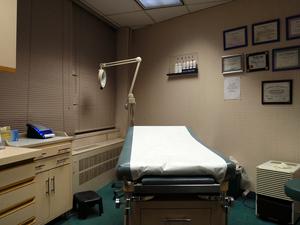Health care as a human right
(Image: Flickr user Brittany G (cc: by-nc-sa))
The following is a partial transcript; for full story, listen to audio.
Since the health care debate began, advocacy groups, including the NAACP and the National Council of La Raza, have been arguing for a public option and for health care that's affordable for all their members. But will they be successful in using a civil rights organizing platform to affect the health care debate?
Statistics show black hospital patients far less likely to survive heart attacks than white patients; black and Hispanic preschoolers less likely to receive asthma medications than white kids; minority residents of nursing homes less likely to get glasses or hearing aids; and minority women wait twice as long as white women for follow-up tests after an abnormal mammogram.
Hilary Shelton is the NAACP's senior vice president for advocacy and policy and director of its Washington bureau. He says the health disparities for minorities include health care coverage.
"When we look at who's actually covered with health care insurance, we know that we have over 46 million Americans who have no health insurance and we know that disproportionately, African Americans and Hispanics are uninsured. So as we move in this direction … we have to make sure that we have health care in America that covers everyone."
According to Jennifer Ng'andu, deputy director of health policy at the National Council of La Raza, the Latino community has been active in lobbying for better health care, but often the media doesn't cover their efforts.
"While we've taken a very civil tone in this debate, the louder, less civil voices have been more apparent in the media coverage," said Ng'andu.
Kathleen Hall Jamieson, director of the Annenberg Public Policy Center at the University of Pennsylvania, says affordable health care can be considered a fundamental human right. But the problem lies in translating the idea into a "right."
"One of the problems in this debate is [that] the presumption that non-citizens should not be covered all but eliminates the discussion of rights. If it's a right, it's fundamental, humans are entitled. And something very problematic occurs when the right is denied. … Virtually everybody on the public stage is saying that some people who are human, and are here, are not entitled. You can't then assert it as a right."
A report from the "American Journal of Public Health" says the deaths of 880,000 people of color would have been prevented if real health care reform had been enacted in the last decade.
The NAACP, La Raza and many other minority groups have formed a coalition called "Health Equity for All," and have launched a new ad campaign to ensure minority voices are heard in the healt care debate.
The World is an independent newsroom. We’re not funded by billionaires; instead, we rely on readers and listeners like you. As a listener, you’re a crucial part of our team and our global community. Your support is vital to running our nonprofit newsroom, and we can’t do this work without you. Will you support The World with a gift today? Donations made between now and Dec. 31 will be matched 1:1. Thanks for investing in our work!
